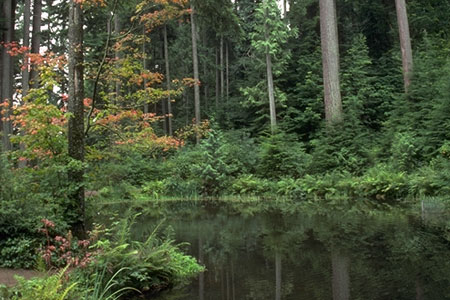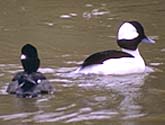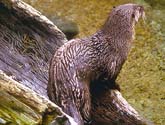
Home |
About Us |
How to Participate |
Biodiversity Modules |
Projects |
Maps |
News |
Resources

Home |
About Us |
How to Participate |
Biodiversity Modules |
Projects |
Maps |
News |
Resources
|
Definition of "Wetlands" - General Code 500: Vegetated areas where plants are rooted in water or water saturated soil or that regularly tolerate flooding for extensive time periods. |
Wetlands: Conifer Marsh (524)

| |
| Descriptive Habitat Code: This wetland (5) is a freshwater marsh (2) surrounded by conifer trees (4). | |
| Photo: KMD | |
 American black bear Ursus americanus Code: URAM Photo: Natures Pics | Distribution and
Habitat: It is found in mountainous, forested, and wetland habitats Diet: Interesting fact: |
 American wigeon Anas americana Code: ANAAM Photo: RA | Distribution and
Habitat: It is distributed across North America from Alaska southward to Costa Rica Diet: Interesting fact: |
 Bufflehead Bucephala albeola Code: BUAL Photo: RA | Distribution
and Habitat: It is found in both freshwater lakes and wetlands as well as salt marshes and inshore marine areas. Diet: Interesting
fact: |
 Ensatina Ensatina eschsholtzi Code:ENES Photo: WDFW |
Distribution and Habitat: It is found under bark, logs and rocks in coniferous and deciduous forests; both in open and wooded settings. Diet: Interesting fact: |
 Green heron Butorides striatus Code: BUST Photo: RA | Distribution and
Habitat: The green heron is found in secluded wetlands, wooded sloughs, and along slow-moving water in ditches. Diet: Interesting fact: |
 Pacific giant salamander Dicamptodon tenebrosus Code: DITE Photo: BL |
Distribution and
Habitat: It is found in moist forests on the rocky shores of mountain lakes and in or near cold streams. Diet: Interesting fact: |
 Pacific tree frog Hyla regilla Code:PSRE Photo: WDFW |
Distribution and Habitat: It is found throughout the Pacific Northwest, never too far from small ponds. Diet: Interesting fact: |
 Painted turtle Chrysemys picta Code: CHPI Photo: WDFW |
Distribution and Habitat: It is found in wetlands, lakes, ponds and rivers. Diet:
Interesting fact: |
 Raccoon Procyon lotor Code: PRLO Photo: KMD |
Distribution and Habitat: It is native throughout most of the United States and southern Canada, but has also been introduced into Europe and Asia. It is a common inhabitant of agricultural and residential areas. Diet:
Interesting fact: |
 Red-legged frog Rama aurora Code: RAAU Photo: BL | Distribution
and Habitat: The red-legged frog is found in moist grasslands, forests, woodlands, wetlands, stream banks, and in or near other areas with standing water. Diet: Interesting
fact: |
 River otter Lutra canadensis Code: LUCA Photo: RA |
Distribution and Habitat: It can be found in coastal marine areas, rivers and lakes. Diet:
Interesting fact: |
 Steller's jay Cyanocitta stellari Code: CYST Photo: RA |
Distribution and Habitat: It is found throughout conifer forests and developed areas with large trees. Diet: Interesting fact: |
 Van Dyke's salamander Plethodon vandykei Code: PLVA Photo: WDFW |
Distribution and Habitat: It is found under rocks and logs located near lakes, streams, creeks, rivers, wetlands and areas of saturated soil. Diet: Interesting fact: |
 Western pond turtle Clemmys marmorata Code: CLMA Photo: WDFW | Distribution
and
Habitat: It is found in marshes, ponds, streams, rivers, wetlands and ditches. This turtle is primarily found in open canopy forests, such as oak woodlands. It will be found in conifer wetlands that have open meadows and grasslands nearby. Diet: Interesting
fact: |
Home |
About Us |
How to Participate |
Biodiversity Modules |
Projects |
Maps |
News |
Resources